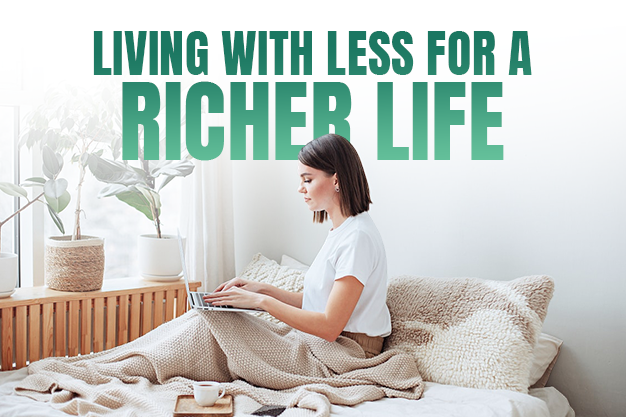Our culture encourages us to follow trends, buy more, and gauge our value by our belongings. This never-ending quest steals peace of mind, depletes bank accounts, and provides fleeting satisfaction.. We lose sight of what we already have. Minimalism is not deprivation; it’s removing what doesn’t serve us and focusing on genuine value. Applied to finances, this becomes transformative. Choose simplicity over chaos, gratitude over wanting, and build a stable, meaningful life. This blog explores how minimalist principles can reshape your money mindset and bring balance to your financial journey.
The Power of Contentment: Quality Over Quantity
Minimalism is about being happy with basic, good-quality stuff that you actually need. When you buy fewer but better things, you get items that last longer and don’t need replacing as often. Buying one good pair of shoes that costs more at first saves you money because you won’t need to keep buying cheap shoes that fall apart. Buy less, buy better, and be happier with what you have.
Step One: Declutter Your Life
Get rid of things you do not need. This helps you see what you really need versus what’s just taking up space. You begin by:
- Assess your stuff: Examine your possessions to identify items that you haven’t touched in a while and ask Do I really need it? The yes or no helps you figure out what’s actually worth keeping.
- Sell or Donate: You can sell stuff you don’t need to make some extra money to buy better versions of things you need. You can also donate items to charity, which clears out your space and helps other people at the same time.
- Adopt a “One In, One Out” Rule: To stop getting cluttered again, make a simple promise: every time you buy something new, get rid of one thing you already have. This habit stops you from collecting too much stuff over time and makes you really think about whether you need something before you buy it.
The money benefit comes from changing how you think about buying stuff. The whole process teaches you to be smarter with money. You learn the difference between wanting and needing.
Financial Wellness Through Minimalist Lifestyle
Adopting a minimalist lifestyle makes your environment simpler and has significant positive effects on financial well-being:
- Reduced Spending: You’ll stop trying to keep up with what everyone else is buying. You will focus on what you actually need and keep more money in your pocket.
- Lower Maintenance Costs: You spend less money on repairs and replacement. This saves time, spending weekends cleaning a bunch of stuff you barely use. You can use that time for more important things or even to earn extra money.
- Increased Savings: You have extra money left over each month that can go into your savings account. You feel secure, confident.
- Freedom from Debt: You can take a more aggressive approach to your debt by eliminating pointless purchases. You can pay more toward the remaining amount, pay off debt, and increase your monthly income.
- Having Clear Goals: Minimalism helps you focus on doing things, building relationships and growing as a person instead of just collecting stuff. Every money decision is simpler and purposeful.
Practical Tips for a Minimalist Financial Journey
Some easy steps to bring minimalism into handling money:
- The Simple Three Part Budget: Here is a dead simple way to budget: just split your cash three ways. Half covers the bills and groceries. Toss another thirty percent or so toward fun stuff. The last twenty is for your future self, meaning savings or killing debt. It is not magic, but it works without the headache.
- Wait Two Days: Give yourself a 48-hour cool-down period before any unplanned purchase. You’ll find most of those “must-haves” lose their appeal, and your future self will be grateful for the saved money.
- Spend on Experiences: New stuff gets old fast. The memory of a great concert or a weekend getaway? That stays with you. Put your cash toward stories you’ll tell for years, not more junk to dust.
- Simplify Your Accounts: Financial clutter is real. Each extra account is another responsibility. Streamline everything. Keep only what you need and watch your financial stress drop.
- Focus on Specific Goals: Your spending has a purpose when you give it one. Get specific. Is your goal a fully-funded safety net? A paid-off car? Visualizing that finish line is the best way to stay on track with your daily choices.
A Richer Life with Less
Less is frequently the starting point for a richer life. Minimalism is releasing from needless stress and creating space for the things that really matter. Getting help makes this process easier and effective. A money coach like Hanaa Al Hinai from Smart Money Education can show you how to match your spending habits with your personal goals. For guidance on this journey, contact her at info@smartmoneyeducation.com. You can align your finances and lifestyle with your objectives by working with her.

